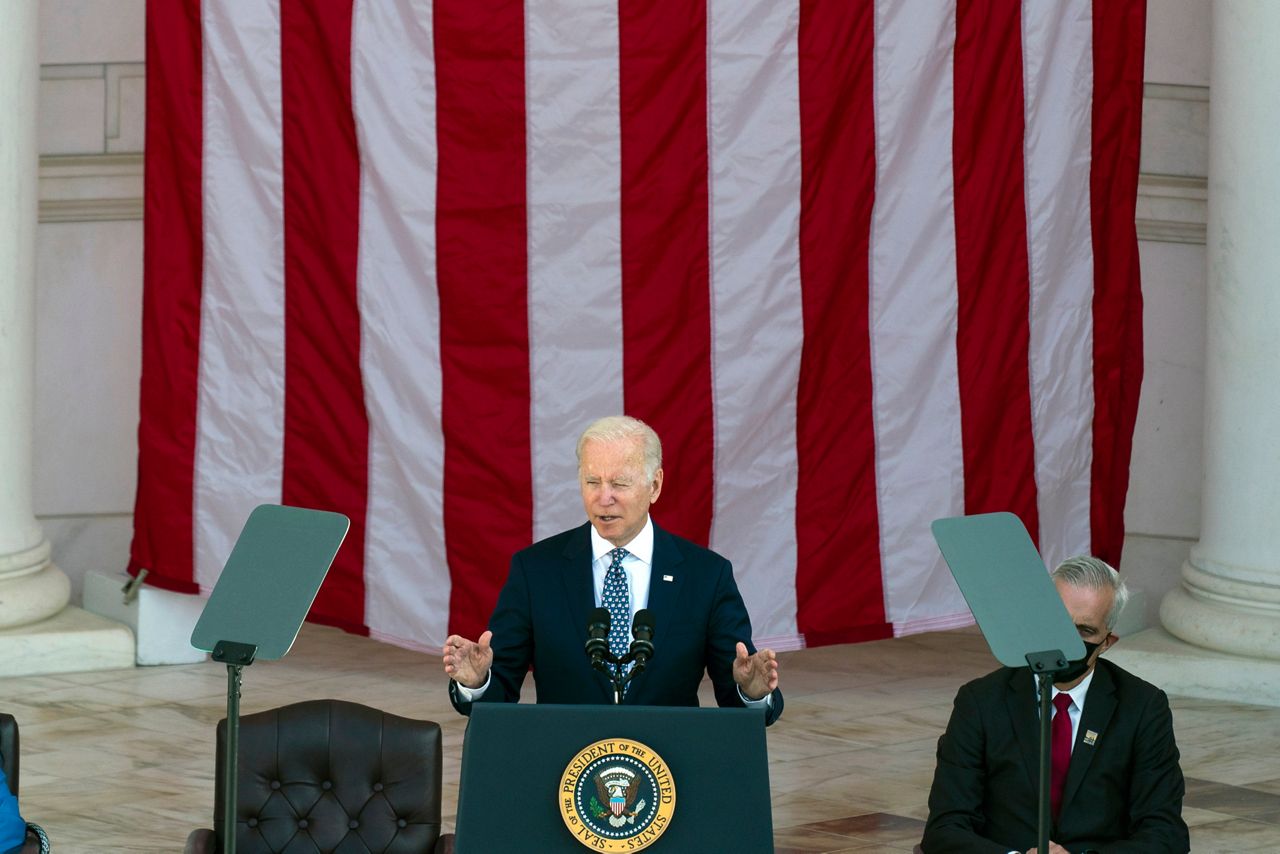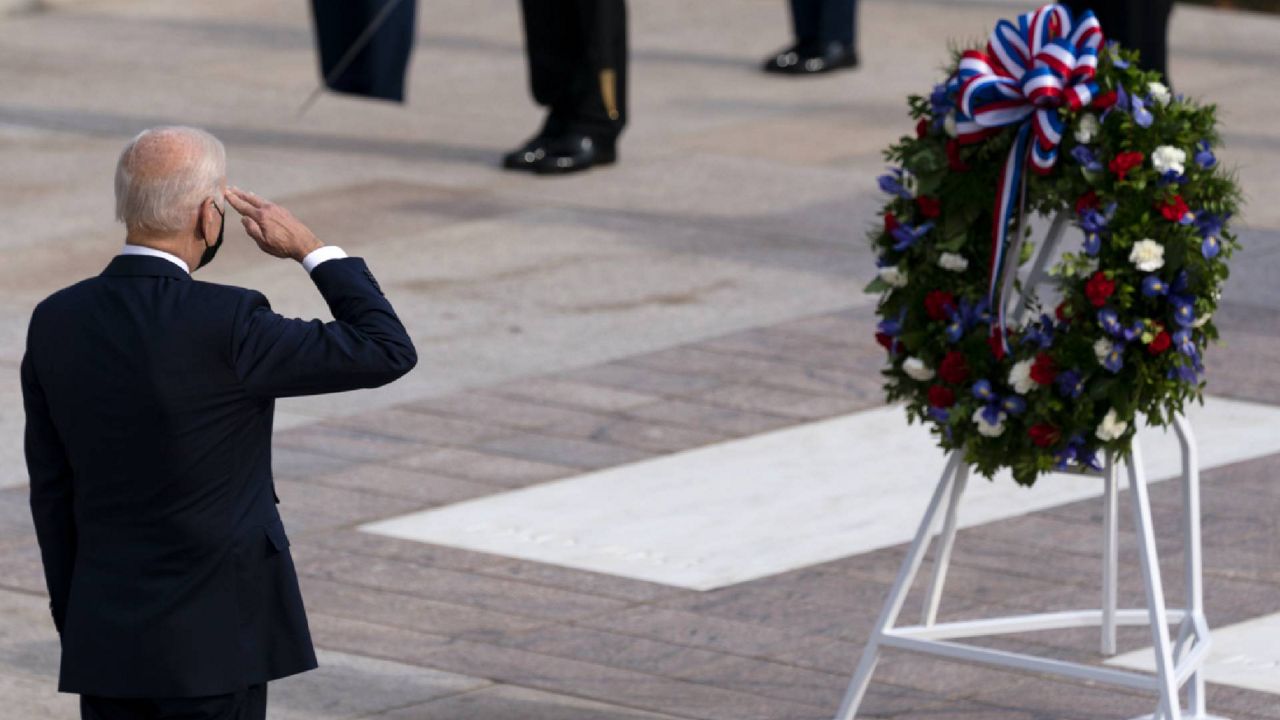“You are the very spine of America,” President Joe Biden told the country’s troops and veterans on Thursday, honoring them this Veterans Day in a wreath-laying ceremony at Arlington National Cemetery.
The president spoke on the same day of another occasion at the cemetery: 100 years after the dedication of the Tomb of the Unknown Soldier, where three unidentified U.S. soldiers are interned, serving as a symbolic resting place for all of the unknown Americans who died in combat.
After laying a wreath at the tomb Thursday morning, Biden gave a speech in which he called the bond between veterans both grave and unique, a “badge of courage.”
“You have endured and survived challenges most Americans will never know. You've come through the trials and testing. Brave dangers and deprivations. Faced down the tragic realities of war and death,” he said.
“You've done it for us. You've done it for America — to defend and serve American values. To protect our country and our Constitution against all enemies, to lay a stronger, more secure foundation.”

Earlier in the day, Biden’s administration announced a federal effort to better understand, identify and treat medical conditions suffered by troops deployed to toxic environments.
That expanded effort centers on lung problems suffered by troops who breathe in toxins and the potential connection between rare cancers and time spent overseas breathing poor air, according to the White House. Federal officials plan to start by examining lung and breathing problems but say they will expand the effort as science identifies potential new connections.
Biden’s son, Beau, served in Iraq, and the president has suggested a potential link between Beau’s death from an aggressive brain cancer and his exposure to toxins in the air, particularly around massive pits where the military disposes of waste by burning. There’s no scientific evidence to establish that link.
At Arlington Cemetery on Thursday, Veterans Affairs Secretary Denis McDonough said it was the “job of every American” to look out for veterans outside of the government’s committed role.
“Because whenever someone signs up to honor our country in the military, our nation makes them a simple promise: If you take care of us, we'll take care of you. If you fight for us, we'll fight for you. If you serve us, we’ll serve you when you come home,” the VA secretary said.
President Biden echoed that commitment, saying: “Every day we honor that great debt, we recommit ourselves to keeping our sacred obligation as a nation to honor what you've done.”
This year’s Veterans Day commemoration comes just two months after Biden ordered the withdrawal of U.S. troops from Afghanistan, a chaotic ending to America’s longest war where 2,461 American service members were killed over the nearly 20-year conflict.
He also paused to remember three high-profile veterans who recently died, Colin Powell, the former chairman of the Joint Chiefs of Staff and secretary of State; Gen. Ray Odierno, an Army chief of staff and top general in Iraq, and Sen. Max Cleland, a Georgia Democrat who lost three limbs while serving in Vietnam.
The president also had a direct message for veterans: Take care of your mental health as you would other combat wounds.
“I want to say clearly to all our veterans: If you're struggling — you're so used to never asking for anything — if you're struggling, reach out. Call the Veterans Crisis Line,” he said. “Having trouble thinking about things, it's no different than if you had a wound in your arm.”
The Biden administration’s federal effort on toxic exposure is also designed to make it easier for veterans to make claims based on their symptoms, to collect more data from troops who are suffering and to give veterans more time to make medical claims after symptoms such as asthma and sinus problems develop.
“We’re discovering there is a whole host of lung conditions related to deployment,” said Dr. Richard Meehan, an immunologist and rheumatologist. The retired U.S. Naval Reserve officer, who served in the Mideast during the 1990s and again in 2008, is co-director of the Denver-based National Jewish Health Center of Excellence on Deployment-Related Lung Disease.
Beau Biden’s death was a defining moment for Joe Biden, one he said affected his decision to sit out the 2016 presidential race. The younger Biden deployed from October 2008 until September 2009 as a captain in the Delaware Army National Guard. In 2013, he was diagnosed with a tumor, and he died two years later at age 46.
The new rules will allow veterans to make claims within 10 years of service, and the government has changed how it determines what symptoms count and why.
The U.S. military has been aware for years of health risks associated with open-air burn pits. In 2013, federal investigators found a military camp in Afghanistan was operating a pit for more than five years, nearly four times longer than Pentagon rules allowed. The Defense Department has said burn pits should be used only as a temporary last resort when no other alternative trash disposal method is feasible, still they have persisted for years.



